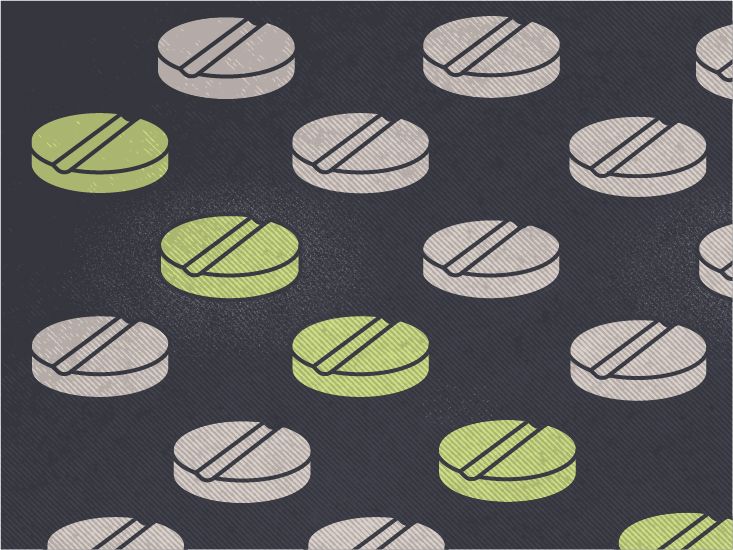The Link Between Obsessive List Making and ADHD
List making is a common habit for many people. We make grocery lists, to-do lists, and more to help keep our lives organized. However, some people take list making to an extreme level, spending excessive amounts of time compiling lists and finding the act addictive. When list making becomes obsessive and compulsive, it may be a sign of an underlying issue like attention-deficit/hyperactivity disorder (ADHD).
What Causes Obsessive List Making?
List making activates the brain's reward center by causing a release of dopamine. For some, this can become addictive. Those with ADHD in particular may be prone to obsessive list making tendencies due to their brains having impaired dopamine signaling.
People with ADHD also often have executive functioning challenges, meaning they have difficulty with organization, focus, planning, and managing time. Compiling lists excessively can be an attempt to exert control and order over their symptoms.
Connections Between ADHD and Obsessive Behaviors
ADHD and obsessive-compulsive disorder (OCD) share some overlapping symptoms and brain abnormalities. Both involve dopamine and serotonin signaling systems not working optimally. There are strong hereditary links as well, with about 20-30% of people with OCD having a close relative with ADHD.
While list making itself is not considered an OCD tendency, the obsessive and compulsive nature of extreme list making indicates similar thought patterns. For some with ADHD, making lists becomes a ritualistic behavior they feel driven to perform.
Signs List Making Has Become Problematic
List making can enhance productivity, but how do you know when it's become excessive? Signs your list making may be obsessive compulsive include:
- Spending over 1 hour per day making lists, even if tasks are already complete
- Feeling stressed or anxious if unable to make lists
- Creating lists for minor tasks, unimportant items, or unneeded organization
- Finding it difficult to stop adding to lists or making new ones
- Having lists that are extremely detailed or lengthy
If your list making exhibits these obsessive tendencies, consider speaking to a mental health professional. Finding more productive outlets could improve your daily functioning.
Treatments for Obsessive List Making
If compulsive list making is disruptive to your life, know there are effective treatment options available, including:
Medications
Stimulant medications used for ADHD like Adderall, Ritalin, and Vyvanse boost dopamine signaling, which could reduce obsessive tendencies. Anti-anxiety or antidepressant medications may also be helpful. A psychiatrist can determine if medication could benefit you.
Psychotherapy
Cognitive behavioral therapy (CBT) helps identify unhealthy thought and behavior patterns, developing tactics to challenge them. CBT could help minimize anxiety driving obsessive list making and establish healthier coping strategies.
ADHD Coaching
An ADHD coach works one-on-one, teaching organizational skills, time management, and productivity habits. Developing these abilities could improve executive functioning challenges underlying compulsive list making tendencies.
Using Lists Effectively
Not all list making is detrimental. Using lists productively could still benefit those who tend towards obsessive tendencies. Some tips include:
- Making lists only when needed, not compulsively
- Using lists for complex tasks or during busy times
- Keeping lists clear, simple, and to the point
- Checking off and discarding completed lists
- Focusing lists only on high-priority items
Ask trusted friends or family if your list making seems excessive. Having objective feedback helps determine if your habits are obsessive.
Coping with ADHD and Obsessive Behaviors
Finding balance with list making and other potential obsessive tendencies requires self-compassion. Remember, these behaviors arise from ADHD challenges, not personal shortcomings. Be patient with yourself as you develop healthier coping strategies.
Create Structure and Routine
Consistency helps those with ADHD feel in control while limiting obsessive tendencies. Follow daily and weekly routines organizing tasks, breaks, meals, and more. Making reasonable schedules reduces stress and anxiety driving compulsive habits.
Practice Mindfulness
Mindfulness and meditation build self-awareness of thoughts underlying behaviors. Noticing obsessive list-making urges as they arise can help pause and consciously change course to more productive activities.
Develop Healthy Dopamine Sources
Engage in activities offering purpose, motivation, and accomplishment. Social connection, adequate sleep, creative hobbies, and exercise boost dopamine too. Meeting emotional needs in healthy ways minimizes clinging to obsessive tendencies trying to fill inner voids.
Learning to identify signs obsessive list making has become uncontrolled is needed first step toward change. From there, implementing lifestyle changes, skills building, and perhaps professional treatment can help get compulsive habits under control so they no longer interfere with daily life.
FAQs
Why do some people with ADHD engage in obsessive list making?
List making activates the brain’s reward center for some people, causing addictive dopamine release. Those with ADHD often have impaired dopamine signaling, making them prone to seeking extra dopamine through obsessive behaviors like compulsive list making.
Is extreme list making a symptom of OCD as well as ADHD?
While compulsive list making itself is not an official OCD symptom, the obsessive and perfectionistic nature of the habit indicates thought patterns common to OCD. ADHD and OCD share genetic links and underlying brain abnormalities.
How can I control my obsessive urges to make lists?
Strategies to help overcome obsessive list making include mindfulness techniques, developing consistent daily routines, finding healthy dopamine-producing activities, and practicing organizational skills. Seeking counseling and ADHD coaching can teach healthy coping strategies as well.
Are there medications that can treat compulsive list making?
If list making compulsions are disrupting your life, speaking to a psychiatrist about medication options is recommended. Stimulants used for ADHD as well as certain anti-anxiety or antidepressant medications may help reduce obsessive thinking patterns contributing to excessive list making.
Disclaimer: This article is for informational purposes only and does not constitute medical advice. Always consult with a healthcare professional before starting any new treatment regimen.
Related Coverage
Find out why ADHD and hypermobility often coexist, their shared symptoms, and practical tips to reduce pain and improve focus....
Games build crucial skills for children with ADHD. Explore top game types and titles that create engaging outlets for energy and improved focus, memory and coordination....
Comparing Strattera and Ritalin for ADHD treatment. Find out which medication may work best for your symptoms and lifestyle....
Learn how apple cider vinegar capsules and liquid formats compare in terms of active compounds, health benefits, taste, dosing, side effects and more....
Adderall shortages make getting prescriptions difficult. This guide covers pharmacy locator tools, therapeutic alternatives, provider communication, and unmedicated ADHD coping strategies....
Choosing the right doctor requires assessing your health priorities and needs. Research physician qualifications, check access and availability, get recommendations....
Feeling stuck? Task paralysis can halt progress even when you want to move forward. Learn how to recognize and overcome it....
Actress Geena Davis has been open about living with ADHD, including being diagnosed in her 40s. She advocates for awareness and proper representation of the disorder....
Learn how Quillivant XR interactions with drugs, alcohol, and supplements can affect your health. Stay safe and informed....
Learn how long Adderall stays effective for ADHD symptoms with immediate and extended release forms. Get tips for timing doses and minimizing ongoing side effects....








